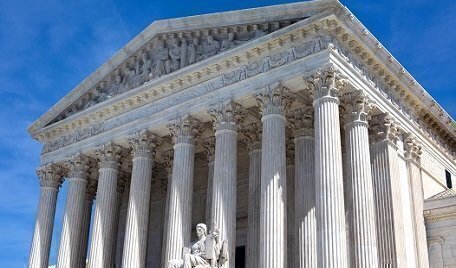On Tuesday morning, the Supreme Court will hear arguments in a dispute about a defendant’s claim to double jeopardy if they have multiple trials related to one incident.
 In Currier v. Virginia, the debate in the Court is about a concept called issue preclusion. Also known as collateral estoppel, issue preclusion is the legal idea that a defendant can’t be tried for the same issue in more than one criminal trial. But what happens when a defendant, charged with three crimes related to an incident, agrees to a separate trial for one of those three crimes? Can the facts be introduced in a second trial if in the first trial the defendant is found not guilty? Or does that violate double jeopardy – the idea that a person can’t be tried twice for the same crime?
In Currier v. Virginia, the debate in the Court is about a concept called issue preclusion. Also known as collateral estoppel, issue preclusion is the legal idea that a defendant can’t be tried for the same issue in more than one criminal trial. But what happens when a defendant, charged with three crimes related to an incident, agrees to a separate trial for one of those three crimes? Can the facts be introduced in a second trial if in the first trial the defendant is found not guilty? Or does that violate double jeopardy – the idea that a person can’t be tried twice for the same crime?
In the current case, Michael Currier was arrested after a safe full of cash and 20 firearms was stolen from a house. Currier faced three charges: breaking and entering; grand larceny; and possessing a firearm after being convicted of a felony. Both sides agreed to have two trials. The first trial dealt with the breaking and entering, and grand larceny charges. The second trial dealt with the felon-possession charge, which avoided having Currier’s prior conviction introduced in the first jury trial.
In the first trial, the prosecution introduced an eyewitness account of Currier in a vehicle at house and a co-defendant said Currier took part in the break-in. Currier’s defense said he was not at the scene. The jury found Currier not guilt based on the evidence presented at trial.
Currier then objected to the second trial, claiming he was being tried twice on the same facts. A state court ruled that Currier wasn’t facing harassment and the second trial was proper because it protected Currier from testimony about this prior conviction in the first trial. It allowed the second trial to proceed, where a jury, hearing the evidence presented in a different way, convicted Currier and he was sentenced to five years in prison.
In its appeal to the Supreme Court, Currier’s legal team, led by Jeffrey Fisher, makes several arguments. First, they believe that lower federal courts are divided on the issue of multiple trials related to the same incident can be barred under the Fifth Amendment’s Double Jeopardy Clause if an acquittal is involved in that process. They also believe state courts are divided on the same general question.
The Supreme Court needs to decide the issue, they believe, because in current times prosecutors bring multiple charges in a case, and one of the charges could prejudice a jury because of a defendant’s past behavior. “Even when the double jeopardy issue here is not directly litigated, it looms over virtually every criminal case in which severance is a possibility,” they claim.
The state of Virginia sees things in a different way and that Currier agreed to have a second trial for his own benefit. “When defendants agree to risk the hazards of a second trial, they do so with full knowledge that they may be acquitted during the first trial and that there is a significant societal ‘interest in giving the prosecution one complete opportunity to convict those who have violated [the State’s] law,’” Virginia argued in a court brief.
Virginia also says the Currier had a choice to go to trial on all three charges. “If a defendant makes that choice, undue prejudice can be avoided by asking the government to stipulate that the defendant is a felon and through the use of limiting instructions. Petitioner therefore is wrong that he was put to an impermissible ‘Hobson’s choice,’” the state concluded. It also doesn’t see a problem with the same facts being introduced in two trials.
Among those filing supporting petitions in the case are the Cato Institute in favor of Currier and the federal Justice Department in support of Virginia.
Scott Bomboy is the editor in chief of the National Constitution Center.







